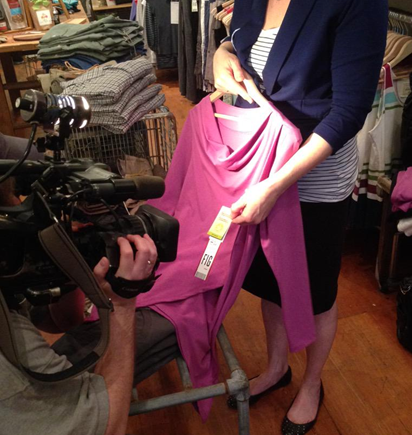WATCH: A new viral campaign is shining a light on the darker realities of cheap clothing. Peter Kim reports
TORONTO — A social experiment by Fashion Revolution recorded on camera has earned more than three million views.

The video shot in Berlin, Germany shows people wandering to a vending machine drawn by the promise of a cheap shirt. After selecting their size they’re shown the harsh realities and menial wages that go into manufacturing the low-priced garment.
The shoppers are then given the choice to continue with their purchase or donate to charity. Many of them choose the latter.
The project is meant to shine a light on some of the darker realities of the clothing and fashion industry and inspire more ethical purchasing.
Patagonia has been a leader in the area of sustainability and social responsibility, according to Kelly Drennan, founding executive director of Fashion Takes Action.
“For years they’ve been using recycled polyester to make their fleeces,” said Drennan. “And on the social side, they’re making sure they’re sourcing their factories and paying their workers a fair living wage.”

Get daily National news
The company’s Worn Wear program also encourages shoppers to send their used clothing to others interested in the brand, which limits over-consumption and waste.
H&M has also shown initiative when it comes to sustainability according to Drennan.
“They offer full transparency on their website. You can actually download their sustainability report and even see video footage in some cases of the inside of their factories,” she said. “They also have a water conservation program and a take back program at some of their stores, so you can actually take back old clothing.”
For those looking for a less mainstream selection there are plenty of options.

Julie Skirving, owner of clothing retailer Logan & Finley, sells higher end clothing with an ethical focus.
“Miik is a brand made right here in Toronto. Their products are made of bamboo which is actually milled here in a closed loop process which is more sustainable,” said Skirving.
Fig is another line the Queen West store carries. Many of its products are made with organic cotton which “is always better because there’s no pesticides used in the production of it,” she said.
One way to track down ethical options is by looking for third-party certification. Garments with the bluesign label have met among the most stringent standards in the world, including those related to consumer safety, resource productivity and air and water emissions.
A recent report, Behind the Barcode, outlines troubling figures worn by the global clothing and fashion industries. Among the findings:
- 91 per cent of companies don’t have full knowledge of where their cotton is coming from
- 75 per cent don’t know the source of all their fabrics
- Over 85 per cent of companies are not paying their workers enough to meet basic needs
- 48 per cent haven’t traced where their clothes are being made
In April of 2013 a garment factory in Dhaka, Bangladesh crumbled killing 1,133 people and injuring over 2,500 more. Since then massive scrutiny has been aimed at the ethical practices of garment factories and the North American retailers relying on them.
But boycotting a brand may not be the best option, explained Chris MacDonald, director of the Ted Rogers Leadership Centre at Ryerson University.
“In the wake of the Rana factory collapse, for example, there were a lot of people who said: ‘I’m not going to buy from Joe Fresh anymore’ which is exactly the wrong thing to do because people in Bangladesh desperately need those jobs. They’re not great jobs but they’re better than the alternative,” said MacDonald.
He suggests buying from the brands with the financial and logistical resources that would allow them to ensure adherence to labour standards abroad, and then supporting the charities on the ground working to improve factory conditions.







Comments